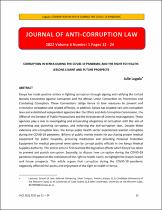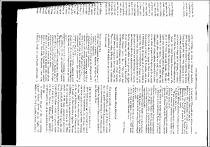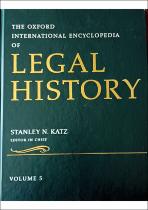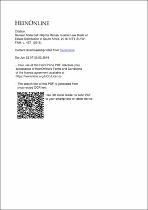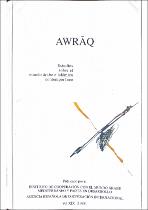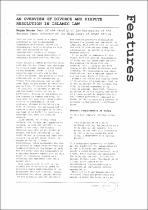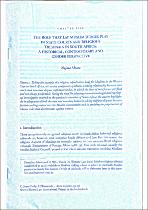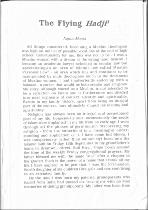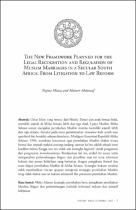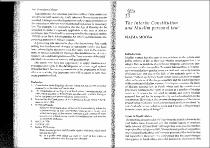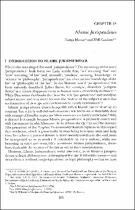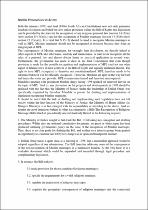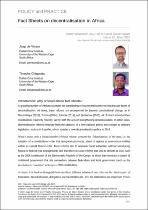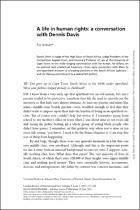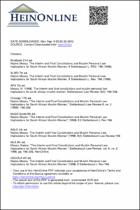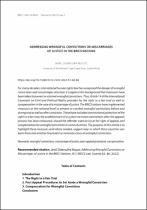Faculty of Law: Recent submissions
Now showing items 61-80 of 907
-
Corruption in Kenya during the Covid-19 pandemic and the right to health: Lessons learnt and future prospects
(University of the Western Cape, 2022)Kenya has made positive strides in fighting corruption through signing and ratifying the United Nations Convention Against Corruption and the African Union Convention on Prevention and Combating Corruption. These Conventions ... -
Women, gender and child marriage: Sub-Saharan Africa, overview
(Encyclopedia of Women and Islamic Cultures, 2006)This entry provides an overview of early marriage of girls under the age of 18 from a human rights and gender perspective. It examines international conventions relating to child marriage and critiques the application of ... -
Chapter 6: Culture and religion
(Juta, 2007)This chapter deals with the relationship between gender equality and rights to practice culture and religion. In South Africa this relationship is of crucial importance to women who live according to the rules and principles ... -
South Africa: Indian Law
(Oxford University Press, 2009)The South African legal system comprises common law (Roman-Dutch and English law developed through case law) legislation and (mainly African) customary law with elements of Muslim, Hindu, Jewish and Zoroastrian (Parsi) ... -
Islamic mode of estate distribution in South Africa
(Jordan Publishing LexisNexis, 2016)It has been argued by some academics that the Islamic law of intestate succession discriminates against females due to its unequal distribution of shares in favour of males.' The general example used in this regard is when ... -
Women and the Islamic Law of Intestate Succession
(African Law Review, 1994)Islamic law of succession consists of two parts mainly voluntary and compulsory. The voluntary part reers to the limited freedom of testation where a muslim can dispose of 1/3 of his or her assets via a will. Normally this ... -
Women's eligibility for the qadiship (judicial office)
(AWRAQ, 1998)There is no express Qur'anic text or tradition (Sunna) of Prophet Muhammed (P.B.U.H) for against the idea of women occupying the office of judge (qadi) which implies that God never intended to discriminate in this area. ... -
An Overview of Divorce and Dispute Resolution in Islamic Law
(LexisNexis, 2004)This article is based on a paper presented at International Conference on Divorce: Causes and consequences held in Beijing in July 2004 and sponsored by the International Society of Family Lawyers and China University of ... -
The role that lay Muslim judges play in state courts and religious tribunals in South Africa: A historical, contemporary and gender perspective
(Kluwer, 2002)Taking the example of a religious adjudicative body for Muslims in the Western Cape in South Africa, this article analyses the symbiotic working relationship between state courts and non-state dispute settlement bodies, ... -
The Flying Hadji
(Stellenbosch: Institute for Theological Interdisciplinary Research (EFSA) in cooperation with CCAWT Research, 2000)All things considered, becoming a Muslim theologian was high on my list of possible vocations at the end of high school. Unfortunately for me, this was not to be I was a Muslim woman with a dream at the wrong time. Instead, ... -
The new framework planned for the legal recognition and regulation of Muslim marriages in a secular South Africa: From litigation to law reform
(Ahkam Journal, 2022)Muslims, who originate from the East Indies and the Indian subcontinent, have a history in South Africa dating back more than three centuries. Attempts by South African Muslims to have their Muslim marriages (nikāḥs) ... -
The interim Constitution and Muslim personal law”
(Cape Town Community Law Centre, 1995)Muslim women face the same status problems in the private and public spheres of life as their non-muslim counterparts but it is alleged that, as members of a particular religious community, they experience another inequality. ... -
Chapter 18 Islamic Jurisprudence
(Juta, 2004)What is the meaning of the word Jurisprudence? The etymology of the word 'jurisprudence' hails from two Latin words; first, 'ius' meaning 'law' and 'iuris' meaning 'of law' and secondly, 'prudens' meaning 'knowledge' or ... -
Muslim Personal Law (MPL) in review”
(Centre for Contemporary Islam UCT, 1999)Both the interim (1993) and final (1996) South African Constitutions now not only guarantee freedom of religion and belief but also makes provision within the Bill of Rights that legislation can be provided by the state ... -
Muslim divorce and the 1996 Divorce Amendment Act: The cart before the horse?
(De Rebus, 1999)The purpose of this article is to clarify some issues regarding Muslim divorces which have been the topic of debate in previous issues of De Rebus (1997 DR 495; 1998 (Jan) DR 55; 1998 (Aug) DR 31). The Divorce Amendment ... -
Muslim Marriage and Divorce in Sri Lanka: Aspects of the relevant jurisprudence
(The Center for Islamic and Middle Eastern Legal Studies, 2016)Muslims form 10 per cent of the Sri Lankan population. The country applies a mixed legal system. For many decades Muslim marriages and divorces have been governed by a separate piece of legislation. Courts in Sri Lanka ... -
Fact sheets on decentralisation in Africa
(UTS ePRESS, 2022)A growing number of African countries are considering or implementing reforms that include forms of decentralisation. At times, these reforms are underpinned by (recent) constitutional change, as in Mozambique (2018), ... -
A Life in Human Rights: A Conversation with Dennis Davis’ London Review of International Law
(Oxford University Press, 2021)Dennis Davis is Judge of the High Court of South Africa, Judge President of the Competition Appeal Court, and Honorary Professor of Law at the University of Cape Town. In this wide-ranging conversation with Tor Krever, he ... -
The interim and final constitutions and Muslim Personal Law: implications for South African Muslim women
(Stellenbosch Law Review, 1997)All women face similar status problems in the private and public spheres of life but it is alleged that, as members of a religious community, Muslim women experience another inequality. This double inequality has resulted ... -
Addressing wrongful convictions or miscarriages of justice in the BRICS nations
(University of Tyumen, 2022)For many decades, international human rights law has recognised the danger of wrongful convictions and miscarriages of justice. It is against this background that measures have been taken to prevent or combat wrongful ...

